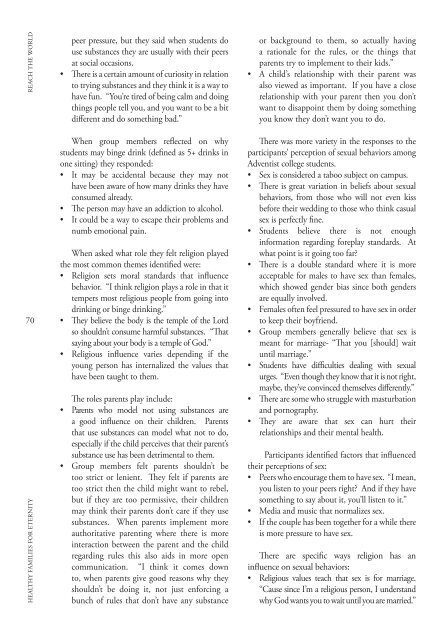HEALTHY FAMILIES FOR ETERNITY
FM_Planbook%202016-eng
FM_Planbook%202016-eng
You also want an ePaper? Increase the reach of your titles
YUMPU automatically turns print PDFs into web optimized ePapers that Google loves.
<strong>HEALTHY</strong> <strong>FAMILIES</strong> <strong>FOR</strong> <strong>ETERNITY</strong> REACH THE WORLD<br />
70<br />
peer pressure, but they said when students do<br />
use substances they are usually with their peers<br />
at social occasions.<br />
• There is a certain amount of curiosity in relation<br />
to trying substances and they think it is a way to<br />
have fun. “You’re tired of being calm and doing<br />
things people tell you, and you want to be a bit<br />
different and do something bad.”<br />
When group members reflected on why<br />
students may binge drink (defined as 5+ drinks in<br />
one sitting) they responded:<br />
• It may be accidental because they may not<br />
have been aware of how many drinks they have<br />
consumed already.<br />
• The person may have an addiction to alcohol.<br />
• It could be a way to escape their problems and<br />
numb emotional pain.<br />
When asked what role they felt religion played<br />
the most common themes identified were:<br />
• Religion sets moral standards that influence<br />
behavior. “I think religion plays a role in that it<br />
tempers most religious people from going into<br />
drinking or binge drinking.”<br />
• They believe the body is the temple of the Lord<br />
so shouldn’t consume harmful substances. “That<br />
saying about your body is a temple of God.”<br />
• Religious influence varies depending if the<br />
young person has internalized the values that<br />
have been taught to them.<br />
The roles parents play include:<br />
• Parents who model not using substances are<br />
a good influence on their children. Parents<br />
that use substances can model what not to do,<br />
especially if the child perceives that their parent’s<br />
substance use has been detrimental to them.<br />
• Group members felt parents shouldn’t be<br />
too strict or lenient. They felt if parents are<br />
too strict then the child might want to rebel,<br />
but if they are too permissive, their children<br />
may think their parents don’t care if they use<br />
substances. When parents implement more<br />
authoritative parenting where there is more<br />
interaction between the parent and the child<br />
regarding rules this also aids in more open<br />
communication. “I think it comes down<br />
to, when parents give good reasons why they<br />
shouldn’t be doing it, not just enforcing a<br />
bunch of rules that don’t have any substance<br />
or background to them, so actually having<br />
a rationale for the rules, or the things that<br />
parents try to implement to their kids.”<br />
• A child’s relationship with their parent was<br />
also viewed as important. If you have a close<br />
relationship with your parent then you don’t<br />
want to disappoint them by doing something<br />
you know they don’t want you to do.<br />
There was more variety in the responses to the<br />
participants’ perception of sexual behaviors among<br />
Adventist college students.<br />
• Sex is considered a taboo subject on campus.<br />
• There is great variation in beliefs about sexual<br />
behaviors, from those who will not even kiss<br />
before their wedding to those who think casual<br />
sex is perfectly fine.<br />
• Students believe there is not enough<br />
information regarding foreplay standards. At<br />
what point is it going too far?<br />
• There is a double standard where it is more<br />
acceptable for males to have sex than females,<br />
which showed gender bias since both genders<br />
are equally involved.<br />
• Females often feel pressured to have sex in order<br />
to keep their boyfriend.<br />
• Group members generally believe that sex is<br />
meant for marriage- “That you [should] wait<br />
until marriage.”<br />
• Students have difficulties dealing with sexual<br />
urges. “Even though they know that it is not right,<br />
maybe, they’ve convinced themselves differently.”<br />
• There are some who struggle with masturbation<br />
and pornography.<br />
• They are aware that sex can hurt their<br />
relationships and their mental health.<br />
Participants identified factors that influenced<br />
their perceptions of sex:<br />
• Peers who encourage them to have sex. “I mean,<br />
you listen to your peers right? And if they have<br />
something to say about it, you’ll listen to it.”<br />
• Media and music that normalizes sex.<br />
• If the couple has been together for a while there<br />
is more pressure to have sex.<br />
There are specific ways religion has an<br />
influence on sexual behaviors:<br />
• Religious values teach that sex is for marriage.<br />
“Cause since I’m a religious person, I understand<br />
why God wants you to wait until you are married.”


